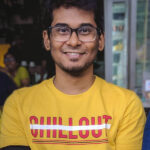
2022
|
|
Why did you choose to do a PhD?
Curiosity. A PhD may be many things, but it is most definitely not boring. Who would not want to ideate concepts and hypotheses into the real world through experimentation and analysis. The chance to help humanity through our research is very enticing.
Why did you choose to do graduate education at NUS? If you received offers from other universities, why did you pick NUS?
Multi-disciplinary exposure, access to cutting-edge equipment/infrastructure and the expertise of the PI/laboratory I was interested in were some of the biggest reasons for NUS topping my list against other options. Additional bonuses of being excellently located for travel, the diverse & vibrant culture, and amazing food nudged me along my decision of studying at NUS. And I have to say there’s nothing quite comparable to other institutions around the world.
How does graduate school compare to your undergraduate experience?
My undergrad and master’s degrees were great experiences on their own. Developed lasting friendships and learned a little about a lot of things. But the itch that wasn’t scratched was digging deep into my area of interest with research with sufficient guidance for a significant period of time. PhD at NUS on the other hand, provided the ability and some maturity to dig deep whilst being guided into frontiers that were unbeknownst while I was younger. That science is never just experimentation and results but understanding a bigger picture to address through our research.
Briefly share about your research or thesis (i.e. dissertation topic for Masters by Coursework students).
My PhD project revolves around a rodent model of transient cerebral ischemia aka stroke and the epigenetic regulation of microglia (a glial cell population) in the brain. The effect of reperfusion mediated injury to the brain microenvironment by microglia is hypothesized to be influenced by epigenetic regulators that can be controlled by epigenome altering drugs. In this case, histone deacetylase inhibitors are epi-drugs that inhibit histone deacetylase enzymes (making DNA wrap tighter around histone proteins, regulating gene expression without altering sequence of the genome themselves). The focus on the project has evolved to delineate the temporal and spatial changes observed within microglia and neuron-microglia interactions through assessment of high-res single cell morphometry and phenotype variation across brain geography, transcriptomic and epigenetic profiling.
What impact do you hope to have with your research?
Understanding scientific research is the collective effort of our community around the world- I hope a tangible change arises through my successes and failures inside the laboratory; pushing the envelope of science an inch forward to enable potential development of therapeutics in my area of research (ischemic strokes).
Share a challenge you faced in graduate school and how you overcame it.
The impact of covid-19 on classes, access to lab facilities, collaborations and travel were some momentary challenges. Roadblocks with experiments, time management and the stress of handling deadlines were challenges that appeared to be more than momentary. Rather than jumping across them, the inherent nature of doing a PhD taught most of us how to work around these challenges. Communicating with colleagues, friends and supervisors to help troubleshoot a particularly difficult experiment or practicing sufficiently to optimize time has allowed such issues to feel less troublesome.
Share something about campus life at NUS that new students would be interested to hear about.
NUS houses some of the best on-campus cafeterias that I have ever seen. For someone who shies away from having to cook, this is a special perk. Sports/physical activity facilities and periodic events organized on campus keeps us engaged outside of the research and coursework in the best way.

